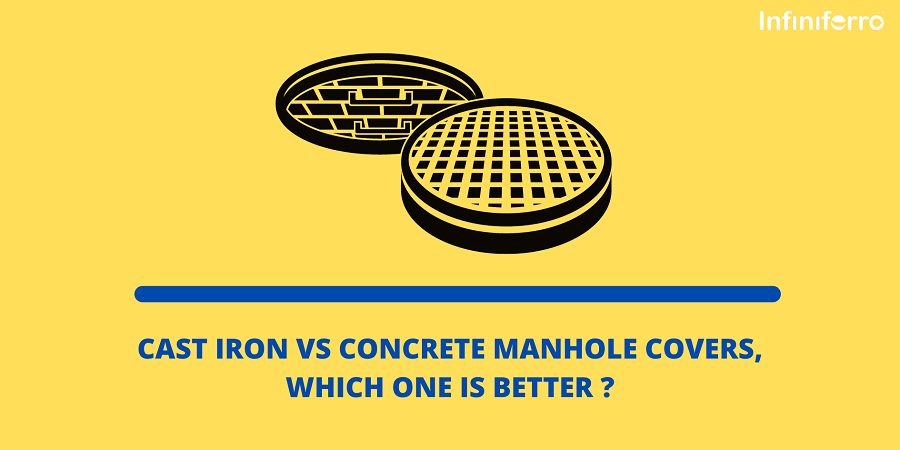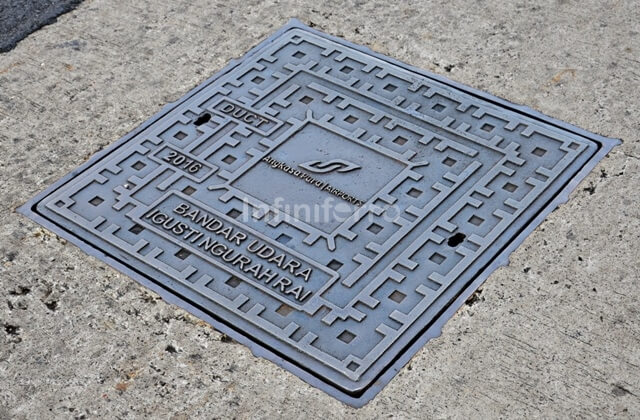
Manhole covers or drainage covers can be made of cast iron, composite, and concrete. These materials each have advantages and disadvantages. In this article, we will discuss the differences between cast iron vs concrete manhole covers based on the material, manufacturing, and design.
1. Material
Cast iron manhole covers are made of cast iron (FC) and ductile iron (FCD). Ductile iron is grade A cast iron, while cast iron (FC) material is cast iron with a grade below ductile iron.
Ductile iron material is harder and stronger than cast iron. It is used to make heavy-duty manhole covers. Cast iron material is used to make light-duty and medium-duty manhole covers.
While the concrete manhole cover is made of sand and cement materials and other supporting materials.
2. Manufacturing
The manufacturing process of manhole cover cast iron is through a metal casting method. This process consists of design, pattern making, mold making, smelting, pouring, finishing, and quality control.
The manufacturing process of concrete manhole covers is simpler, by mixing all the materials needed to make the manhole cover.
The manufacturing process of concrete manhole covers does not require special skills such as in the manufacturing process of cast iron manhole covers which requires foundry expertise.
3. Life Time
You can use the cast iron manhole cover for a long time because it is made of cast iron that is strong and able to withstand weather changes.
While manhole covers made of concrete material, tend to be easily damaged due to weather changes. Often we encounter porous concrete manhole covers due to exposure to hot weather and rain.

4. Strength
The next difference between cast iron and concrete manhole covers is in terms of strength. Cast iron material is hard and not easy to crack, so it can withstand high loads.
Thick cement concrete manhole cover also has high enough strength, but cannot last for a long time.
5. Price
In terms of price, cast iron manhole cover has a relatively standard price. The price is following the grade of material used. FCD material has a higher price than FC material.
While the concrete manhole cover has a more affordable price because the price of the materials made is also cheaper. Raw materials for making concrete manhole covers, such as sand and cement, are easily available in building material stores at affordable prices.
6. Security
Iron material has a high selling price, so cast iron manhole covers are prone to theft. Usually cast iron manhole covers are stolen for resale.
However, for the safety of the cast iron manhole cover can be circumvented by using hinges to unite the cover and frame. In addition, you can also design a frame with holes so that cement concrete can enter the hole and strengthen the frame installation.
Concrete manhole covers are unlikely to be stolen because they are less valuable. Furthermore, concrete manhole covers have heavy weight making it difficult to move.
7. Design
Cast iron manhole covers can be designed customizable or according to customer wishes and according to needs in the field. This custom design, for example, uses the writing of the project name and company logo. In addition, custom manhole covers can also be designed with various colors. Thus the cast iron manhole cover can function as a beauty of urban planning.
As for the cement concrete manhole cover, it only has a standard design. Usually, this concrete manhole cover is designed in plain shape.
Which one is better?
You can use this comparison of the 7 differences between cast iron vs concrete manhole covers as a consideration in choosing the type of manhole cover that you will use.
Each material has its own advantages and disadvantages. For the selection, you can adjust it to your budget and needs.

This is a great comparison of cast iron and concrete manhole covers. It’s fascinating to see how each material excels in different areas; cast iron for strength and theft resistance, and concrete for affordability and insulation. Ultimately, the better choice depends on the specific needs of the location, like weight capacity, climate and security concerns. Thanks for sharing this informative breakdown. Good Job!
Yes, each material has advantages and disadvantages. Thank you for reading this article.